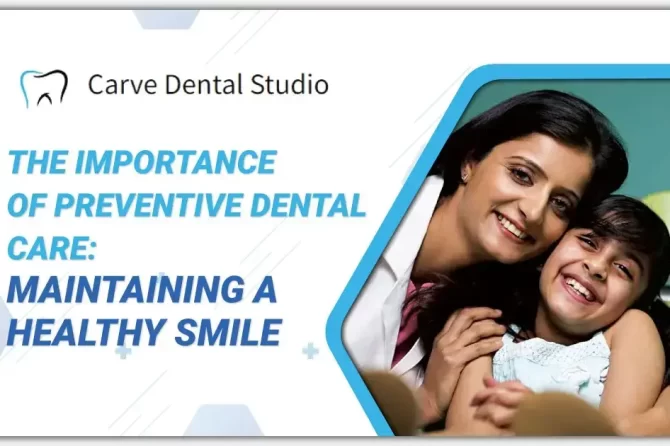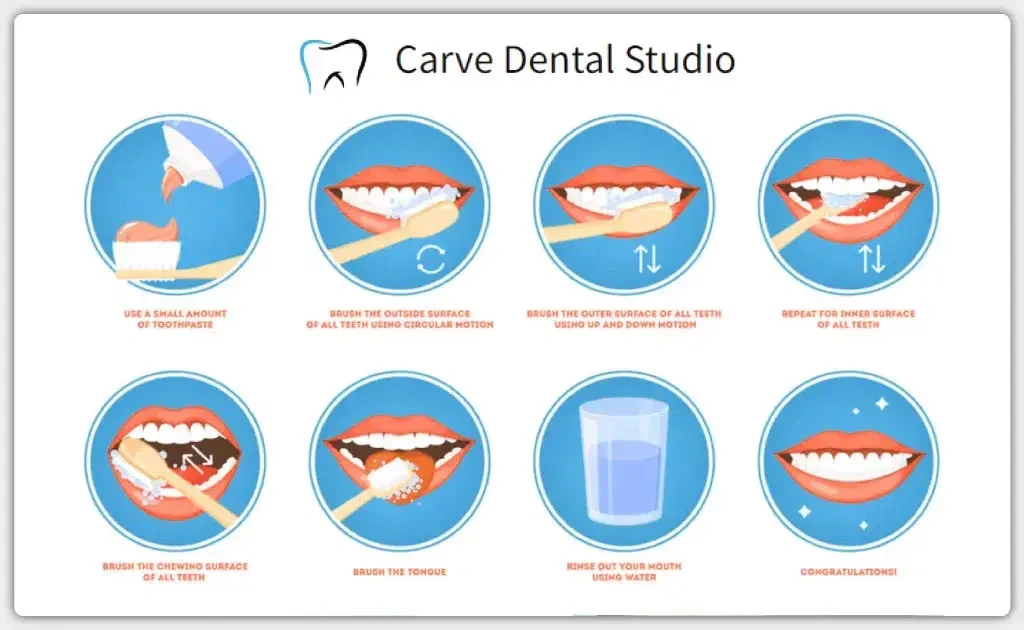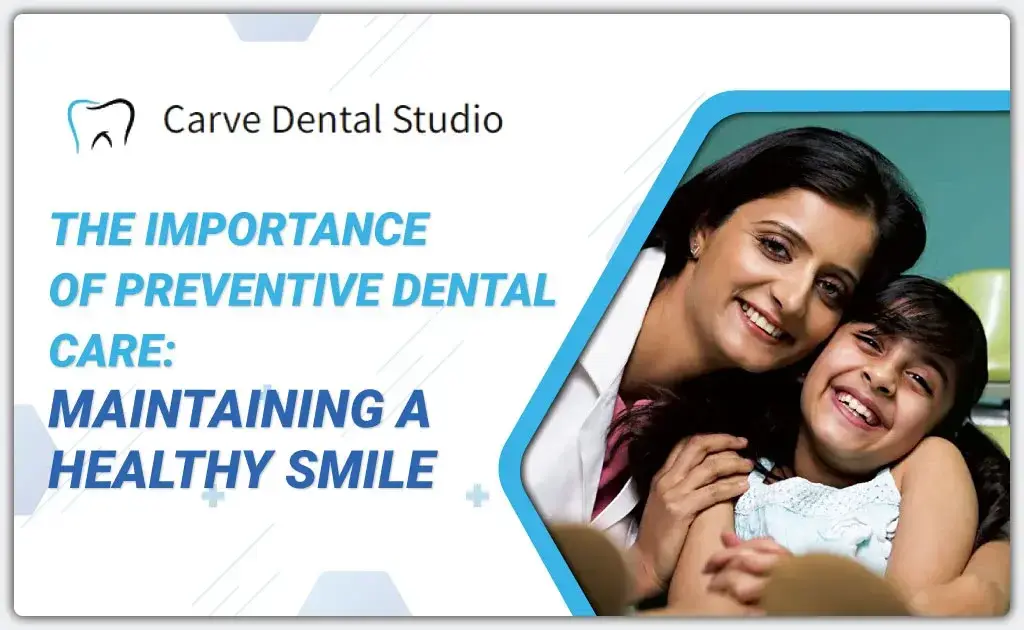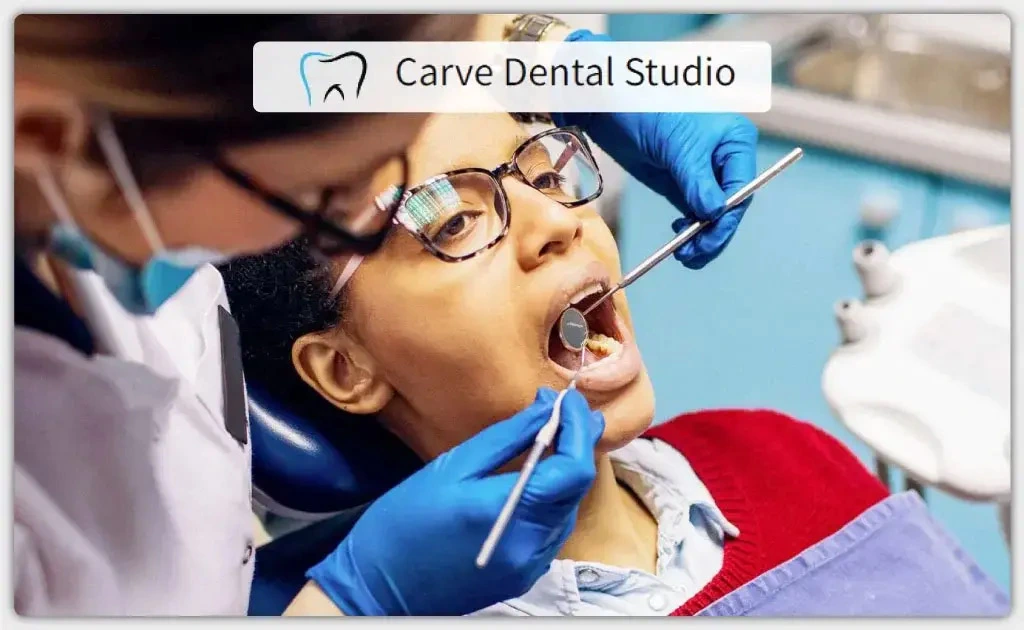
The Importance of Preventive Dental Care: Maintaining a Healthy Smile
Maintaining good oral health is vital for overall well-being. Preventive dental care plays a crucial role in keeping our smiles healthy and preventing dental problems.
By adopting proactive measures and practicing good oral hygiene, we can safeguard our teeth and gums from issues like cavities and gum disease.
In this blog, we will explore the significance of preventive dental care and highlight various aspects of maintaining oral health.
Understanding Preventive Dental Care
Preventive dental care refers to the practices and procedures aimed at preventing dental problems before they occur or progress.
It involves regular check-ups, professional cleanings, daily oral hygiene practices, and education about oral health.
Taking a proactive approach to dental care helps in identifying potential issues early on and addressing them promptly.
Benefits of Preventive Dental Care
Preventive dental care offers numerous advantages. By following good oral hygiene practices and visiting the dentist regularly, we can prevent dental problems such as cavities and gum disease.
Early detection of oral health issues during routine check-ups allows for timely intervention and minimizes the need for extensive and costly restorative treatments.
This approach promotes long-term oral health and overall well-being.
Daily Oral Hygiene Practices
Brushing your teeth at least twice a day with fluoride toothpaste, using proper brushing and flossing techniques, and incorporating mouthwash and interdental cleaning tools contribute to healthy teeth and gums.
Adopting these practices ensures effective plaque removal and reduces the risk of cavities and gum disease.

Professional Teeth Cleaning
Professional dental cleanings are an integral part of preventive dental care. Dental hygienists use specialized tools to remove plaque and tartar buildup that cannot be eliminated through regular brushing and flossing.
Besides maintaining oral health, professional cleanings also contribute to aesthetics by removing stains and brightening the smile.
It is recommended to have professional cleanings at least twice a year for optimal results.
Dental X-rays and Diagnostic Tools
- Detect Hidden Dental Issues: Dental X-rays are an invaluable tool in preventive dentistry. They allow dentists to detect dental problems that are not visible during routine examinations, such as cavities between teeth, impacted teeth, or jawbone issues.
- Early Intervention: By identifying hidden dental issues early on, dental X-rays enable dentists to intervene promptly. This early detection helps prevent the progression of dental problems, minimizing the need for extensive treatments and potentially saving you from discomfort and higher costs in the long run.
- Tailored Treatment Plans: Dental X-rays provide dentists with detailed images of your teeth and oral structures, allowing them to create personalized treatment plans. Whether it’s orthodontic care, dental implants, or root canal therapy, dental X-rays help dentists determine the most suitable course of action for your specific needs.
- Frequency and Safety Considerations: The frequency of dental X-rays depends on various factors, such as your oral health history, age, and risk factors for dental problems. Dentists follow strict safety protocols to minimize radiation exposure during X-rays, ensuring your safety throughout the process.
- Additional Diagnostic Tools: In addition to dental X-rays, dentists use other diagnostic tools, such as intraoral cameras and digital scanners. Intraoral cameras provide real-time visualizations of your mouth, helping dentists explain dental issues and treatment options. Digital scanners create 3D models of your teeth, aiding in accurate diagnosis and treatment planning.
By utilizing dental X-rays and other diagnostic tools, dentists can provide comprehensive preventive care, ensuring your oral health remains in optimal condition.
These tools are essential in identifying hidden dental issues, promoting early intervention, and tailoring treatment plans to meet your specific needs.
Fluoride and Dental Sealants
- Impact of Diet and Nutrition: Your diet plays a crucial role in maintaining oral health. Nutrient-rich foods provide essential vitamins and minerals that promote strong teeth and gums. A well-balanced diet supports the overall health of your mouth, making it less susceptible to dental issues.
- Teeth-Friendly Foods and Beverages: Incorporating certain foods into your diet can contribute to dental health. Crunchy fruits and vegetables like apples and carrots stimulate saliva production, which helps neutralize acids and wash away food particles. Dairy products, rich in calcium, strengthen tooth enamel. Green tea and sugarless chewing gum can also promote oral health.
- Hydration for Oral Health: Staying hydrated is vital for a healthy mouth. Water helps rinse away debris and keeps your saliva flowing, which aids in maintaining a balanced oral environment. Drinking fluoridated water provides an additional advantage as fluoride strengthens tooth enamel and helps prevent tooth decay.
- Avoiding Habits Detrimental to Oral Health: Certain habits can be detrimental to your oral health. Smoking and tobacco use not only stain teeth but also increase the risk of gum disease, oral cancer, and other dental problems. Excessive consumption of sugary and acidic foods and beverages can also erode tooth enamel and lead to cavities.
- Oral Hygiene Habits: Alongside a balanced diet, maintaining good oral hygiene practices is essential. Brushing your teeth at least twice a day, flossing daily, and using mouthwash help remove plaque and food particles, preventing dental issues. Additionally, replacing your toothbrush every three to four months ensures optimal cleaning.
By embracing a healthy diet, including teeth-friendly foods, staying hydrated, and avoiding habits detrimental to oral health, you can nurture your smile and enjoy long-lasting dental well-being.
Combine these practices with regular oral hygiene habits to achieve a radiant smile and overall oral health.

Lifestyle Factors and Diet
- Impact of Diet and Nutrition: Your diet has a significant impact on your oral health. Nutrient-rich foods provide essential vitamins and minerals that promote strong teeth and gums. A well-balanced diet supports the overall health of your mouth, making it less susceptible to dental issues.
- Teeth-Friendly Foods and Beverages: Incorporate these dental health-promoting foods and beverages into your diet:
- Crunchy fruits and vegetables like apples and carrots stimulate saliva production, which helps neutralize acids and wash away food particles.
- Dairy products, rich in calcium, strengthen tooth enamel.
- Green tea contains compounds that suppress the growth of bacteria in the mouth.
- Sugarless chewing gum increases saliva flow, aiding in the remineralization of teeth.
Avoiding Habits Detrimental to Oral Health: Steer clear of these habits that can harm your oral health:
- Smoking and tobacco use stain teeth and increase the risk of gum disease, oral cancer, and other dental problems.
- Excessive consumption of sugary and acidic foods and beverages can erode tooth enamel and lead to cavities.
By adopting a diet rich in teeth-friendly foods, avoiding harmful habits, and maintaining good oral hygiene practices, you can nurture your oral health and achieve a radiant smile.
Remember to brush your teeth twice a day, floss daily, and visit your dentist regularly for check-ups and professional cleanings.
Your efforts toward a healthy lifestyle will be reflected in your oral well-being.
Importance of Oral Health Education
Oral health education plays a vital role in promoting good oral hygiene practices.
Educating individuals about the importance of brushing, flossing, and regular dental visits empowers them to take proactive care of their oral health.
Creating awareness about dental health in communities encourages people to prioritize their oral well-being, leading to healthier smiles and improved overall health.
Regular Dental Check-ups
Routine dental visits are crucial for maintaining oral health. Depending on individual needs, dental check-ups should be scheduled every six months to a year.
During these visits, the dentist examines your teeth and gums, performs necessary dental X-rays, and conducts professional cleanings to remove plaque and tartar buildup.
Regular dental check-ups help in detecting dental issues early, preventing their progression, and promoting overall oral health.

Also Read: Restorative Dentistry for Kids
Conclusion
Preventive dental care is essential for maintaining a healthy smile. By adopting good oral hygiene practices, attending regular dental check-ups, and seeking professional teeth cleanings, we can prevent dental problems and promote long-term oral health.
Incorporating fluoride and dental sealants, making wise lifestyle choices, and embracing oral health education further contribute to overall well-being. Let’s prioritize preventive dental care to preserve our smiles and enjoy the numerous benefits of a healthy mouth.
FAQs
Why is Preventive Dental Care Important?
Preventive dental care helps prevent dental problems, such as cavities and gum disease, ensuring long-term oral health.
How Often Should I Visit The Dentist For Preventive Care?
It is recommended to visit the dentist for routine check-ups and cleanings every six months to maintain optimal oral health.
What Are The Benefits of Professional Teeth Cleanings?
Professional teeth cleanings remove plaque and tartar buildup, preventing gum disease, and cavities, and enhancing oral aesthetics.
Can Preventive Dental Care Save Me Money in The Long Run?
Yes, preventive care is cost-effective as it helps identify and address dental issues early, reducing the need for extensive and expensive treatments.
What Are The Key Components of Preventive Dental Care?
Daily oral hygiene practices (brushing, flossing), regular dental check-ups, and adopting a healthy diet contribute to preventive dental care and maintaining a healthy smile.
Leave a reply
"Since starting this teeth care supplement, I've noticed a remarkable improvement in my oral health. My teeth feel stronger, and my gums seem healthier than ever. <a href="https://36f6fwt637we2z3csjtcwfpf2x.hop.clickbank.net" target="_blank">click here</a>. Highly recommended for anyone looking to enhance their dental care routine!"
Reply